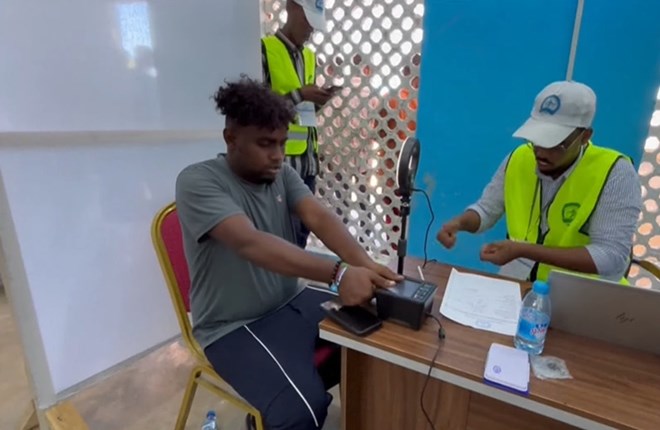
Sunday September 14, 2025

A resident completes biometric fingerprint registration at a voter registration center in Mogadishu. CREDIT/ AFP
Mogadijsu (HOL) — Somalia’s electoral commission has
reopened voter registration centers in Mogadishu, urging residents to sign up under a
new electoral framework that reshapes how the country will vote in the next national election.
The National Independent Electoral and Boundaries Commission said the registration drive is open to both first-time voters and supporters of recently certified political associations, which are expected to shape Somalia’s developing multiparty system.
“The success of our democracy depends on active citizen participation,” the commission said in a statement Saturday. “We call on political associations to take the lead in ensuring every eligible Somali is registered and ready to vote.”
Under the agreement, federal lawmakers will be chosen by state leaders, who in turn will elect the president through the Federal Parliament. The president will retain authority to appoint a prime minister, subject to approval or dismissal by the House of the People.
The deal also recognizes any political group that secures at least 10 percent of parliamentary seats as a national party. Elections will be held under the 2024 Electoral Law, with urgent steps pledged to conduct polls at local, state, and federal levels. Both government and opposition blocs committed to advancing the long-promised transition to direct “one person, one vote” elections, beginning with local and legislative councils.
The registration drive is part of political reforms aimed at strengthening representation and stability in Somalia after decades of conflict. Registration
first began in April 2025, marking the capital’s first universal suffrage exercise since 1969. The process was
extended in July as high demand
saw long queues across all 17 districts of Banadir. The federal government says that nearly 1 million residents registered before voter rolls closed in August for the municipal council elections
The new reopening ensures those who missed earlier rounds can still register, particularly supporters of the newly recognized political associations that emerged after the August deal.
Despite momentum in the capital, challenges remain. On Sept. 8, Puntland deployed forces
to block federal and Northeastern officials from registering voters in contested districts of Sool, highlighting how unresolved disputes between Mogadishu and federal member states could complicate implementation.
Opposition leaders are also split. A faction of the Salvation Forum signed the August accord, but other senior figures, including Wadajir Party leader Abdirahman Abdishakur,
rejected it as incomplete and warned it could prolong Somalia’s crisis.
While citizens will not directly elect the president under the new framework, analysts say voter registration in Mogadishu remains crucial for upcoming municipal council polls, for reinforcing the legitimacy of the broader electoral process, and for shaping the strength of political associations.
Under the previous indirect federal election system, citizens did not vote directly for their members of parliament or for the president. For example, in the 2016 parliamentary elections, the House of the People’s 275 seats were filled by 14,025 delegates selected by traditional elders through clan-based arrangements. These delegates then voted for MPs; state assemblies elected the Upper House, and once both chambers were seated, they elected the president.